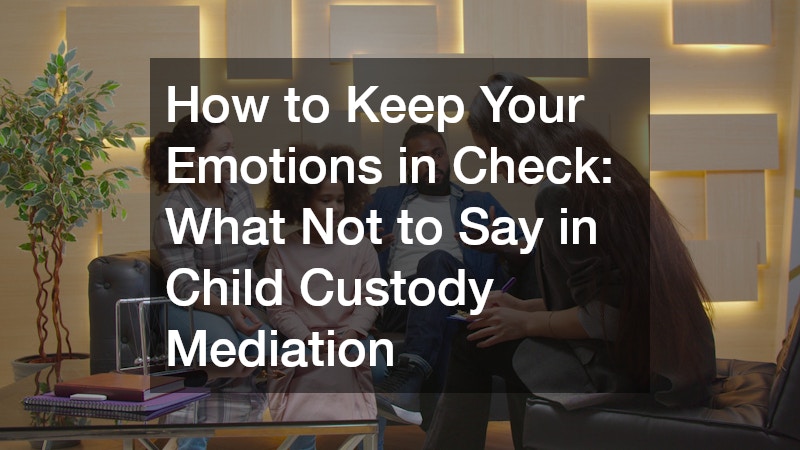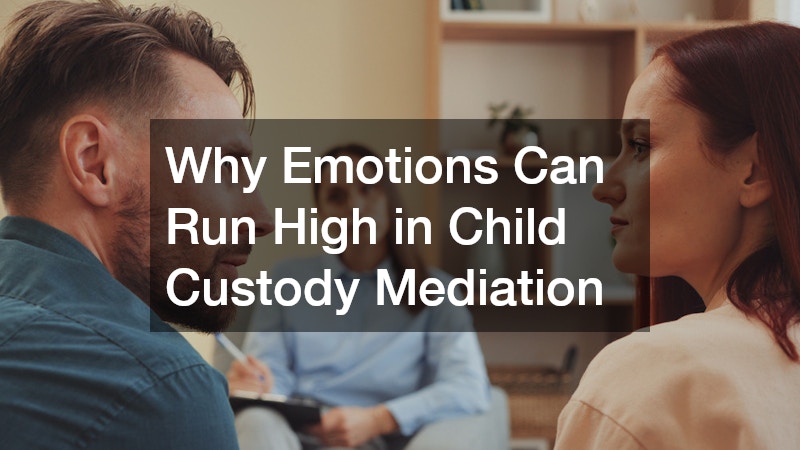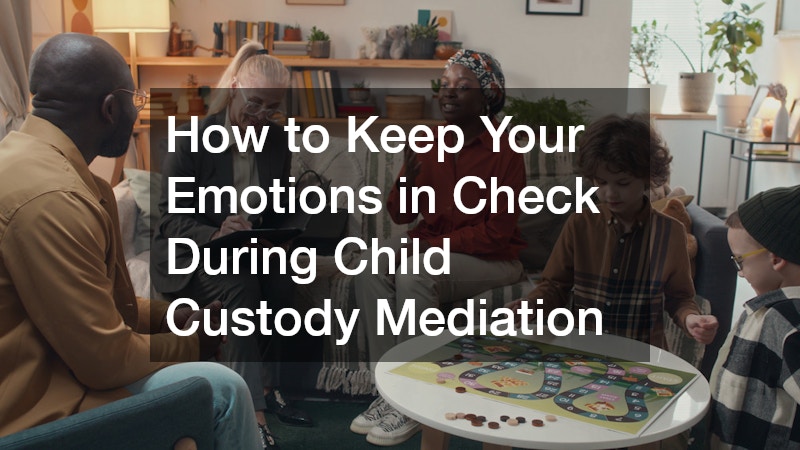Disclaimer: This website shares legal information for educational purposes only and does not constitute legal advice. Please consult a licensed attorney for advice specific to your situation.
Going through a divorce, especially when children are involved, can be a deeply emotional experience. Child custody mediation can bring out strong emotions as both parents are trying to secure what they feel is best for their children. However, it is essential to keep these emotions in check to ensure the best possible outcome. What you say in mediation can significantly affect your case, so understanding what not to say is crucial. In this article, we’ll explore how to stay composed during mediation and avoid saying things that can undermine your efforts.
Why Emotions Can Run High in Child Custody Mediation
Divorce is an emotional rollercoaster for many people. The breakdown of a relationship, especially one involving children, can cause feelings of anger, sadness, frustration, and fear. These emotions are entirely normal, but can become problematic when they manifest in the mediation room.
Mediation for child custody provides a platform for both parents to discuss their wishes and reach a mutually beneficial agreement. However, it is easy to get caught up in the emotional aspect of the situation. If emotions take over, parents may say things that harm their case, strain the mediation process, or negatively impact the children.
What Not to Say in Child Custody Mediation: Key Phrases to Avoid
During mediation, the goal is to focus on the best interests of the child, not to engage in arguments or assign blame. Here are a few things to avoid saying:
1. “I’m the better parent.”
One of the most common mistakes in child custody mediation is making statements that compare parenting abilities. Even if you genuinely believe you are the better parent, stating it explicitly can come across as controlling or dismissive of the other parent’s role. Instead, focus on specific examples of why you believe your parenting approach is in the child’s best interest. Positive, child-centered language will always be more effective.
2. “You’re unfit to be a parent.”
Attacking the other parent’s fitness can escalate tensions and derail the mediation process. Not only does this approach hurt the other parent, but it also paints a negative picture of your ability to co-parent effectively. Even if you have concerns about the other parent’s behavior, it’s important to address them calmly and objectively. Focus on behaviors that affect the child rather than making personal attacks.
3. “I will never let you see the child.”
This type of language can be perceived as vindictive and may harm your credibility. Child custody decisions are made with the child’s well-being in mind, and threats of limiting contact with the other parent are unlikely to be well-received. Instead, emphasize your desire to co-parent and create a balanced, stable environment for the child. If you have concerns about visitation, express them constructively and propose a reasonable solution.
4. “I want full custody.”
While it’s understandable to want what’s best for your child, demanding full custody without being open to compromise can set a combative tone in the mediation. Courts often prefer shared custody arrangements unless there is a significant reason to award full custody to one parent. Instead of making demands, try to explain your concerns and offer practical solutions that prioritize the child’s needs.
5. “I know the child doesn’t like you.”
While it might be tempting to use your child’s words or preferences as leverage, this is a highly sensitive area. Children may express frustration or confusion during a divorce, but it’s essential to remember that they love both parents. Avoid using your child’s opinions or feelings to attack the other parent. Doing so may make the child feel caught in the middle, potentially damaging the parent-child relationship.
How to Keep Your Emotions in Check During Child Custody Mediation
Keeping your emotions under control during child custody mediation is vital for a successful outcome. Here are some tips on how to stay calm and focused during this challenging time:
1. Focus on the Child’s Best Interests
Child custody decisions should always center on the well-being of the child, not personal grievances. Remind yourself that your primary goal in mediation is to create a plan that serves your child’s needs. Keeping this perspective can help you stay focused on productive discussions rather than letting emotions cloud your judgment.
2. Take Deep Breaths and Pause Before Speaking
When emotions are running high, it’s easy to say something you might regret. Before speaking, take a deep breath and pause for a moment to collect your thoughts. This can help you avoid reacting impulsively or saying something that will hinder the mediation process.
3. Use Neutral and Non-Accusatory Language
When discussing concerns or disagreements, it’s essential to use language that is neutral and non-confrontational. Do not say, “You never help with the kids”. Instead, try saying, “I feel overwhelmed with the responsibilities of parenting. Can we discuss a more balanced approach?” This kind of language opens the door for collaboration and problem-solving, rather than placing blame.
4. Seek Professional Support
If emotions feel overwhelming, consider seeking support from a therapist or counselor. They can help you process your feelings and develop strategies for managing them during the mediation process. This will not only help you maintain your composure but also demonstrate your commitment to ensuring the child’s emotional well-being.
5. Stay Open to Compromise
Mediation is about finding common ground. While it’s essential to advocate for your child’s needs, you must also remain open to negotiation and compromise. If you approach the situation with flexibility and a willingness to collaborate, the chances of reaching a favorable outcome increase significantly.
Conclusion
Mediation for child custody can be a challenging process, especially when emotions are high. However, it’s crucial to remain composed and avoid saying things that could negatively impact your case or the child’s future relationship with both parents. By keeping the focus on the child’s best interests, using neutral language, and staying open to compromise, you can navigate this difficult time with greater ease.
Remember, the ultimate goal is to work towards a solution that benefits your child and preserves their emotional health.


